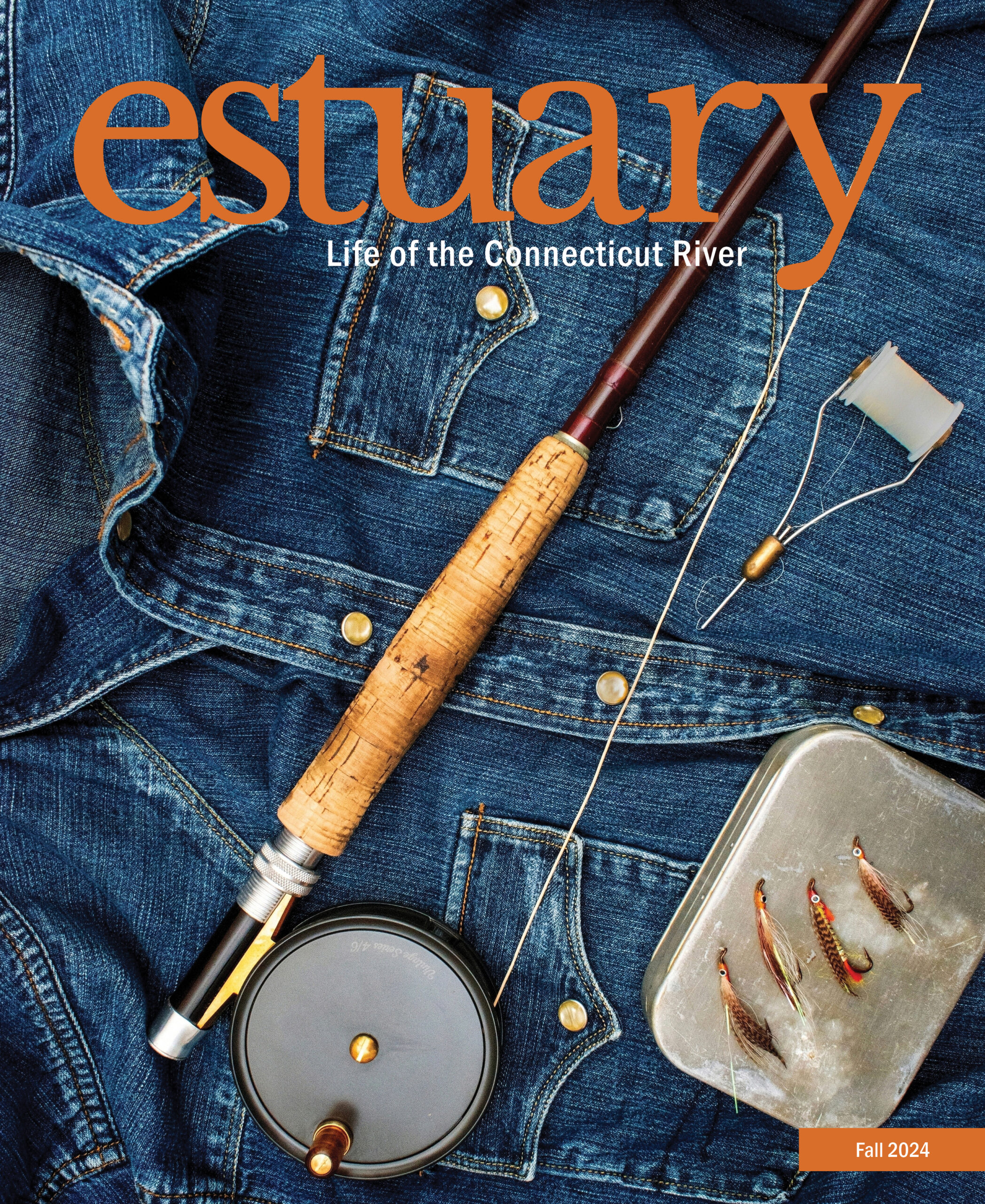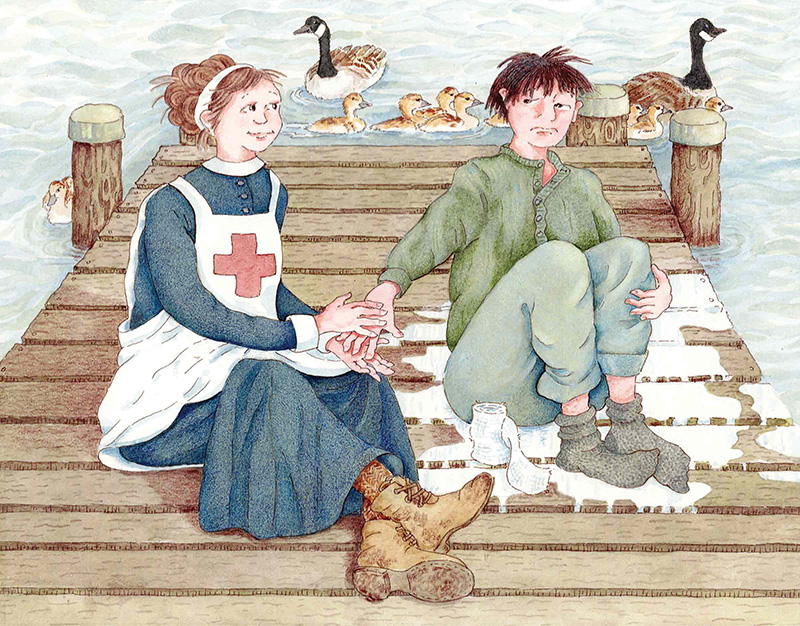 This article appears in the Fall 2024 issue
This article appears in the Fall 2024 issue

Chapter 15: Decisions, Decisions
President Lincoln’s 1862 call for 300,000 fresh volunteers to serve in the Union Army for three years was met with less enthusiasm than the original call for three months of service that JJ and so many other Connecticut men answered with enthusiasm. Even the incentive of a cash payment to enlist didn’t find men rushing to “re-up” for a longer term this time. Word of amputations and death from disease on the battlefield had begun to reach families in every village and borough in the state, including Saybrook. Rumors had begun to circulate about a draft.
 Squire’s niece, Ashley, stood in the open doorway of his cottage, a big red cross stitched onto the front of her white apron.
Squire’s niece, Ashley, stood in the open doorway of his cottage, a big red cross stitched onto the front of her white apron.
“JJ, Ray, come right in. Your timing is perfect,” she said. “You can help me demolish the old chicken coop. First things first, though. I’ve just set the kettle to boil, making a nice pot of tea for Uncle and me.” She kept talking as she walked away from us and toward the kitchen. “Take a seat. You fellows catch up while I raid the biscuit tin.”
“My niece is quite the manager, isn’t she, boys? Tip-top,” Squire said. “I wish she were around more to look after her old uncle, but Ashley’s got ambitions.”
Ashley talks a lot, but I don’t much mind because she always has interesting things to say. While she poured the tea, she kept talking about how much she likes serving as a nurse on the battlefield and how at first she had volunteered to work in a hospital in Washington, DC—“which turned out to be just a two-story house doctors used to isolate smallpox patients. So, they turned me away,” she said. “The Union officers told me I’d be of much greater use on the battlefield, ‘if you’re up to the demands, that is.’ Well! I took that as a challenge. ‘If I were up to the demands.’ Indeed!”
Squire smiled. “Men often make the mistake of underestimating women.”
“Don’t you see a lot of blood? And death?” Ray asked.
“Yes, and the smell of disease is everywhere. Much of the work can be so terribly sad,” she said, as she added milk to her tea, turning the spoon in slower and slower circles, like she was deep in thought. Then she looked up at us and smiled. “That’s how I know I’m needed,” she said. “I have smiles to share and medical know-how to administer.”
“Where did you learn about doctoring?” I asked.
“Nursing,” she said. “I sat in on courses in Boston with Dr. Zak, a woman physician and teacher. When my time in service to the Union ends, Auntie will sponsor me so I can attend her school full-time. It was in one of Dr. Zak’s classes that I gained firsthand knowledge of how to treat an amputee.
“When an amputee is brought into my isolation tent on the battlefield, I treat and dress the open wound to stop any infection from developing. I treat his fear by listening to his stories of home and family.”
The peaceful teatime chat in Squire’s parlor was suddenly interrupted by two loud knocks on his door. The door opened without waiting for so much as an invite to come in.
“JJ—you here? Ray?” ten-year-old Ben panted. “I…ran…all the way here… Cap said for you to come fast. A man—he’s floating face down in the river.”
 Ray, Ashley, and I ran to the dock as fast as we could. The first thing we see is my dad, Cap. He’s wading out into the water alongside the swimming dock, up to his waist, and he’s reaching out with the boat hook trying to grab hold of this man whose arms are thrashing, but he can’t kick because his ankles are bound together.
Ray, Ashley, and I ran to the dock as fast as we could. The first thing we see is my dad, Cap. He’s wading out into the water alongside the swimming dock, up to his waist, and he’s reaching out with the boat hook trying to grab hold of this man whose arms are thrashing, but he can’t kick because his ankles are bound together.
We ran onto the dock, offering a hand to Cap, who had hooked the man’s pantleg and was pulling him in.
When Cap rolled him over onto his back, I could see he was my age—and very much alive. He spit water straight up into the air, like a fountain. He choked, gasped at the air, and yelled at Cap, not the least bit grateful for being rescued.
“Let me be! Leave me alone!” he snarled.
He threw some punches toward Cap that didn’t land. Ray and me each managed to grab one of his arms and hauled him up onto the dock, him fighting us the whole time, tossing his head side to side. “Let me be! Leave me alone!”
“David Eller’s oldest kid,” Cap said. “I recognize him now. Never saw him take off his boots and jacket, walk back out here, or bind his feet up like that. Crazy kid.”
When the fellow quiets down and pulls his knees up to his chest, Ashley sits down on the dock next to him. We stepped back and kept quiet as she unbound his ankles and slowly rolled up the gauze. “What’s your name, soldier?” she says, not looking at him.
“That red cross,” he said, pointing to her apron. “You a nurse?”
“I am,” she said handing him the roll of wet gauze.
“You keep it,” he said. “Name’s David.”
“I don’t see blood on the gauze. Do you have an injury that I can’t see? Maybe a broken bone?” She picked up one of his hands and rested it between her two hands. When he didn’t pull away, Ray and me both gave each other a look.
“No, ma’am. I used that gauze to tie around my ankles so I couldn’t kick once I was in the water. I meant to drown myself, here in Saybrook, so my folks could bury me with the family. I didn’t want my body to rot away on some battlefield, my family never knowing what happened to me. I ran away so I wouldn’t get killed, so I could come home and kill myself. Pretty stupid, huh?”
Ashley smiled and said, “I won’t disagree with you. Want to tell me what brought you to the point of ending your own life?”
And, don’t you know, he lays it all out for Ashley.
“Well, see, there was this battle,” he says. “Once the shooting stopped, the lieutenant looked around at the fellows standing near him for one that wasn’t injured. He points at me and says, ‘You. Take the ambulance wagon out onto the battlefield and pick up any wounded soldiers from our unit.’
“I climbed up onto the wagon, the horses spooked at every noise, ready to balk and run. I saw dead soldiers, their eyes still open. The smell was sickening. I got crazy scared, ma’am. All that blood, hearing near-dead fellows crying out, and just me, alone. I knew I was gonna get shot dead if I went out any farther onto that battlefield. I lay the whip to those two horses, turned the wagon, and headed north. The lieutenant yelled at me and fired a shot. I left off the ambulance a fair distance away, ran into the woods for a while, then jumped on a train heading north. Nobody who saw me knew where I come from or where I was headed excepting to know I’m Union because I’m wearing Northern blue.”
“So, you feel you let your fellow soldiers down?” Ashley said.
“Not at first—I was happy to be free. Then, the closer I got to home, I saw real clear what I done. They got a name for it, ma’am—I’m a deserter. I can’t go back. I figured I’m better off dead.”
“What you did, David…well…you and I, we didn’t grow up in wartime. We don’t know if called upon if we would be brave. We haven’t been tested. But, you wouldn’t want to compound one tragedy with another. You can deal with the punishment for one irrational moment in time when you ran away from responsibility, but it’s your family that would have to deal with your suicide for the rest of their lives.”
“Okay, David,” Cap said, “on your feet. Time for you to go home, get into some dry clothes, put your feet under the table, and have supper with your family.”
 “You’ve got purpose, Ashley,” Ray said, as we walked back to Squire’s cottage, “a real job that you do for the army, a job you’re trained for.”
“You’ve got purpose, Ashley,” Ray said, as we walked back to Squire’s cottage, “a real job that you do for the army, a job you’re trained for.”
“I guess you and me, Ray,” I said, “if we signed up for three years, we could volunteer to be ambulance drivers—that’s something we could maybe do.”
Ashley stopped, turned, and gave me and Ray a long hard, patient look. I’ve seen that look from my mum, a look that says, Are you truly this slow minded?
“Our ambulance drivers tried to cross the river in three places,” Ashley said, “at three different ferry landings, but the ferry owners had taken their families and run to safety. We needed those ferries, but there wasn’t anyone around who knew how to operate a ferry. It’s a dangerous job, but the Union Army needs ferrymen. It’s not just ambulances that need to ford the rivers. The cavalry, and troops, all need to cross rivers.”
“Spit!” I said. “I’ve been looking for something I’d be suited for other than being a ferryman, only to learn that the Union Army needs…”
“Ferrymen.” Ray said, with a shrug.
“As soon as we get back to Uncle’s cottage,” Ashley said, “I’m going to change into my mucking clothes and boots and get started taking the old chicken coop apart. I sure could use some help.”
“Yes, ma’am,” I said. “Demolition. Now there’s something I’m suited for.”
Leslie Tryon is an award-winning author-illustrator of children’s books (Simon & Schuster publisher). Five generations of Tryon’s family served as ferrymen on the Connecticut River between Old Saybrook and Old Lyme, Connecticut, and many of those men were named JJ.
Historical Notes
By the war’s end, five Saybrook men were known to have been deserters, 6,281 in the state of Connecticut. Deserters in the Northern states estimated 270,000. The Confederacy counted 104,428 deserters. Punishment for deserters varied from leniency, to lashing, time in a stockade, and sometimes, death.
At the beginning of the war there were no military ambulance corps. Those ambulances that did exist were driven by civilians who ran as soon as the shooting began. After the battle of Bull Run, with no ambulances to carry the wounded back to Washington, DC, soldiers were left on the battlefield where they fell.
In 1859, Dr. Marie “Zak” Zakrzewska became Professor of Obstetrics and Diseases of Women and Children at the New England Female Medical College in Boston. Dr. Zak opened her own New England Hospital in Boston 1862.
